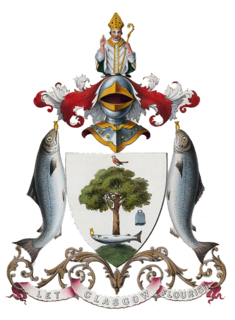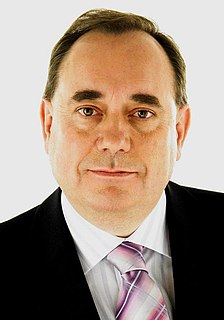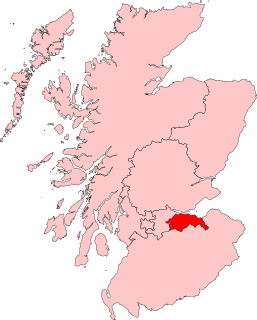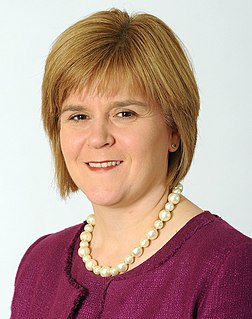
Glasgow City Council, the local government body of the city of Glasgow, Scotland, became one of the newly created single tier local authorities in 1996, under the Local Government etc. (Scotland) Act 1994, with boundaries somewhat different from those of the City of Glasgow district of the Strathclyde region: parts of the Cambuslang and Halfway and Rutherglen and Fernhill areas were transferred from the city area to the new South Lanarkshire council area.
The Scottish Labour Party is the devolved Scottish section of the UK Labour Party.

Iain Cumming Gray is a Scottish politician, currently a Labour Member of the Scottish Parliament (MSP) for the East Lothian constituency. He was the Leader of Scottish Labour in the Scottish Parliament from 13 September 2008 to 17 December 2011. Gray resigned following his party's defeat at the 2011 Scottish Parliament election however, due to his experience; was selected as interim leader following the resignation of Jim Murphy after Scottish Labour's landslide defeat at the 2015 general election; where they lost forty seats to the SNP and only retained a single seat.
Robert McTaggart was a Scottish politician who served as a Member of Parliament (MP) for Glasgow Central, representing the Labour Party. McTaggart was on the left of his party, and took up issues of unemployment and poor housing which affected his constituency. He also took a particular interest in international affairs, being a supporter of the Palestine Liberation Organization and visiting Libya, North Korea and the Soviet Union. McTaggart died of a sudden heart attack at the age of 43.

The 2011 Scottish Parliament election was held on Thursday, 5 May 2011 to elect 129 members to the Scottish Parliament.

The 2007 Scottish Parliament election was held on Thursday 3 May 2007 to elect members to the Scottish Parliament. It was the third general election to the devolved Scottish Parliament since it was created in 1999. Local elections in Scotland fell on the same day.
The Berwick and East Lothian by-election, 1978 was a by-election held for the British House of Commons constituency of Berwick and East Lothian in Scotland on 26 October 1978. It was one of two UK parliamentary by-elections held on that day, and was won by the Labour Party candidate John Home Robertson.

There were elections for the Scottish district councils in 1977.

The 2012 Scottish local elections, were held on 3 May, in all 32 local authorities. The Scottish National Party (SNP) overtook Labour to win the highest share of the vote, and retained and strengthened its position as the party with most councillors. Labour also made gains, while the Liberal Democrats experienced meltdown, falling behind the Conservatives. For the first time since the introduction of the Single Transferable Vote system, the SNP won majority control of 2 councils, from no overall control. Labour also won majority control of 2 councils from no overall control, while retaining majority control over 2 councils.

Edinburgh Southern is a constituency of the Scottish Parliament (Holyrood). It elects one Member of the Scottish Parliament (MSP) by the plurality method of election. Also, however, it is one of nine constituencies in the Lothian electoral region, which elects seven additional members, in addition to nine constituency MSPs, to produce a form of proportional representation for the region as a whole.

Regional elections were held in Scotland on Thursday 8 May 1986, under the terms of the Local Government (Scotland) Act 1973. The previous elections had been held in 1982. The elections took place a year before the Conservative's third general election victory. Elections took place in England and Wales on the same day.

The Scottish parliament election, 2016 was held on Thursday, 5 May 2016 to elect 129 members to the Scottish Parliament. It was the fifth election held since the devolved parliament was established in 1999. It was the first parliamentary election in Scotland in which 16 and 17 year olds were eligible to vote, under the provisions of the Scottish Elections Act. It was also the first time the three largest parties were led by women.

The Linlithgowshire by-election was a Parliamentary by-election. It returned one Member of Parliament to the House of Commons of the United Kingdom, elected by the first past the post voting system.

The 2017 Scottish local elections were held on Thursday 4 May, in all 32 local authorities. The SNP retained its position as the largest party in terms of votes and councillors, despite suffering minor losses. The Conservatives made gains and displaced Labour as the second largest party, while the Liberal Democrats suffered a net loss of councillors despite increasing their share of the vote. Minor parties and independents polled well; and independent councillors retained majority control over the 3 island councils. For the first time since the local government reforms in 1995, all councils fell under no overall control.

The 2015 United Kingdom general election in Scotland was held on 7 May 2015 and all 59 seats were contested under the first-past-the-post electoral system. Unlike the 2010 general election, where no seats changed party, the Scottish National Party (SNP) managed to win all but three seats in Scotland in an unprecedented landslide gaining a total of fifty-six seats and also become the first party in sixty years to win 50% of the Scottish vote. It saw the Labour Party suffer its worst ever election defeat within Scotland losing 40 of the 41 seats they were defending, including the seats of Scottish Labour Party leader Jim Murphy and also the then Shadow Foreign Secretary Douglas Alexander. The Liberal Democrats lost ten of the eleven seats they were defending with the then Chief Secretary to the Treasury Danny Alexander and former leader Charles Kennedy also losing their seats. The election also saw the worst performance by the Conservative Party which received its lowest share of the vote since its creation in 1965, although it retained the one seat that it previously held. In all, 50 of the 59 seats changed party, 49 of them being won by first-time MPs.

An Election to the Edinburgh Corporation was held on 7 May 1968, alongside municipal elections across Scotland. Of the councils 68 seats, 22 were up for election. Despite receiving the most votes of any single party, the SNP won only 7 seats. Unlike in Glasgow, the Progressives and Conservatives did not run on a joint ticket. Despite that however the parties only ran competing candidates in the Gorgie-Dalry ward.

Elections for the City of Edinburgh District Council took place on Thursday 5 May 1988, alongside elections to the councils of Scotland's various other districts.

The fourth election to Lothian Regional Council was held on 8 May 1986 as part of the wider 1986 Scottish regional elections. The Lothian result was little different to the wider Scottish results, which saw Labour making strong gains across Scotland. In Lothian this allowed Labour to secure their majority on the 49-seat council.

Elections for the Glasgow City District Council took place alongside elections to the councils of the other districts in Scotland. The result was victory for the Labour party, who won 59 of the 66 wards.

The 2017 United Kingdom general election in Scotland was held on Thursday, 8 June 2017 and all 59 seats were contested under the first-past-the-post electoral system.


















